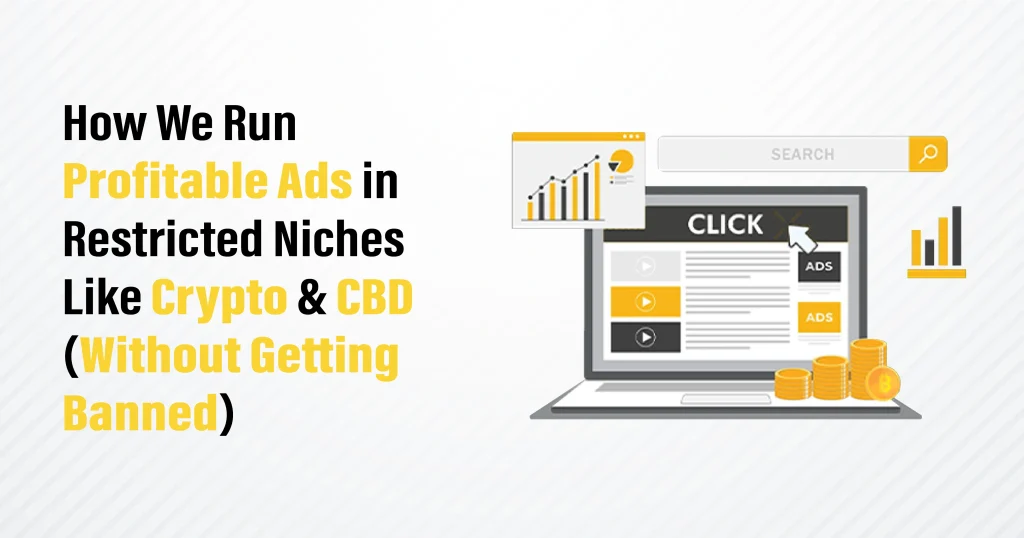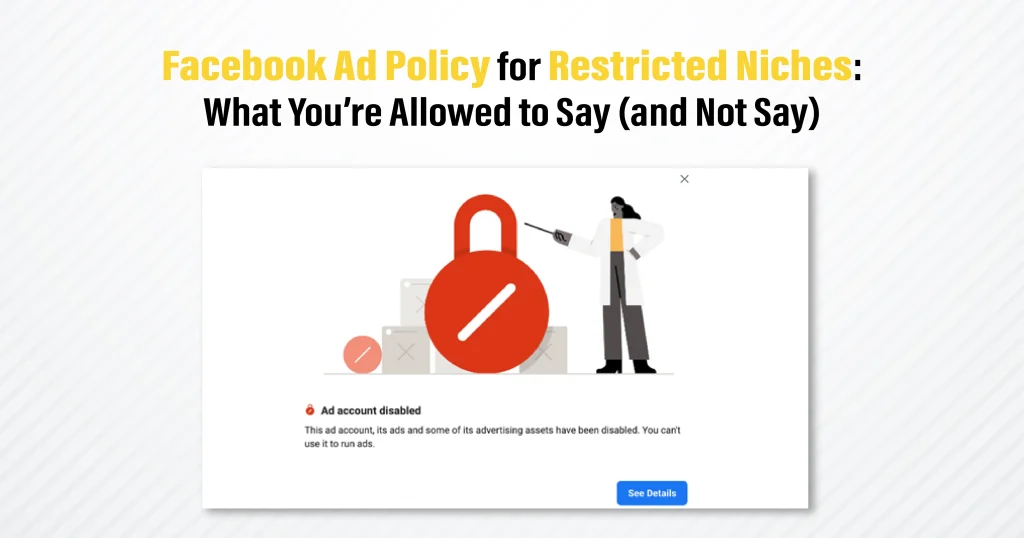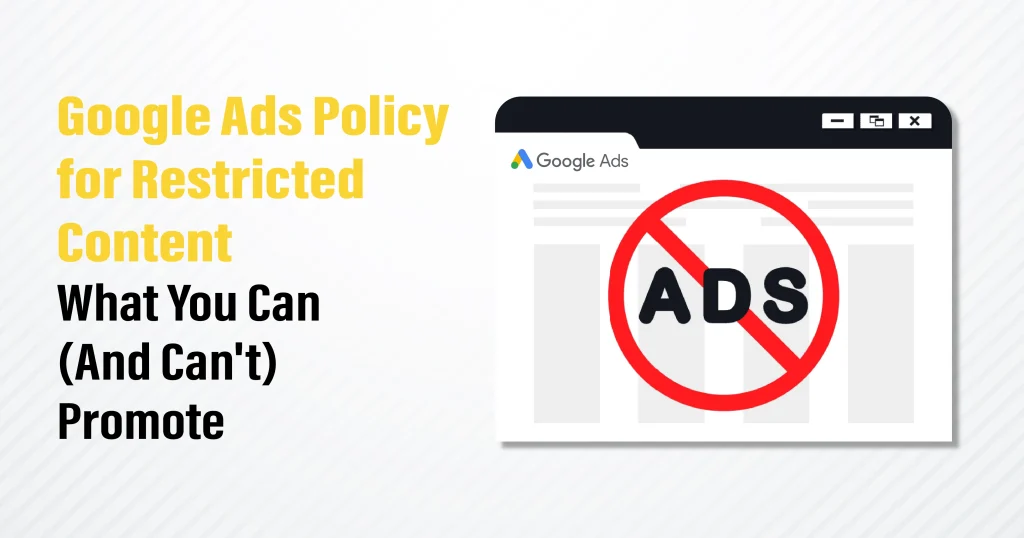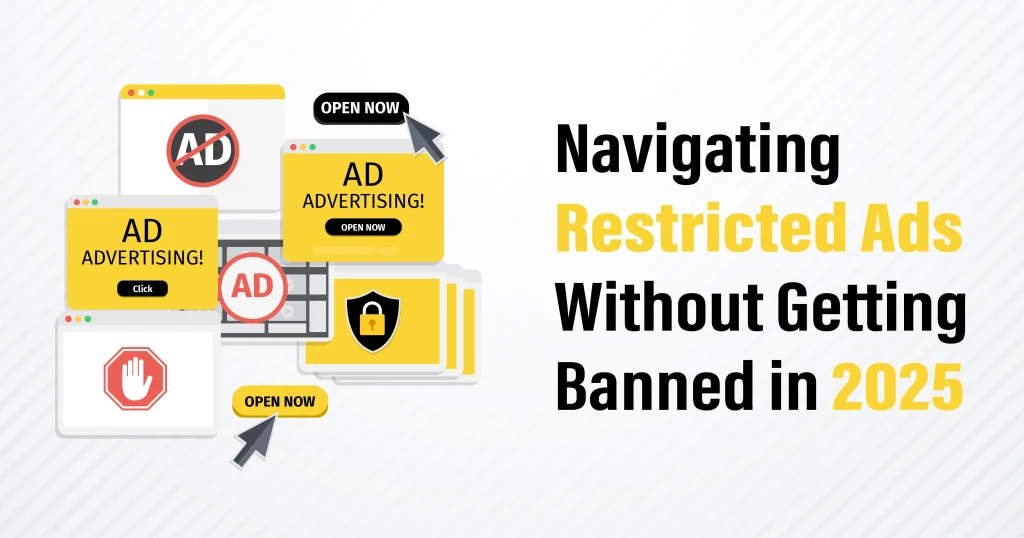
Putting advertisements in limited niches is as good as walking on a tightrope. Make a single mistake and BOOM, gone is your ad account. At Boost Agency Ltd, we have perfected the way to run restricted ads in high-risk sectors, such as crypto and CBD, without any bans.
These niche areas have massive revenue opportunities, yet risks exist. Social networks such as Facebook and Google impose rigid advertisement policies, sometimes unexpectedly. Well, how do we circumvent it? Not by hacking the system, but by understanding the game, playing it smart, and when needed, using ethical cloaking strategies to protect our clients.
Let’s discuss how we do it.
Understanding Ad Policies: What Counts as Advertising Restricted Products?
In the case of advertising restricted products, every advertisement platform the individual uses, such as Google, Facebook, or TikTok, has different regulations and filters. The goal of these platforms is to prevent users from experiencing misleading or harmful content, effectively restricting some industries and imposing a set of requirements or restrictions.
Some of the common restricted ad niches are:
- Cryptocurrency (wallets, exchanges, DeFi platforms)
- CBD and Hemp (particularly edible or medicinal ones)
- Supplements (particularly with health claims)
- Adult content and services
- Gambling, betting, and lotteries
What you can advertise frequently relies upon your location, your affirmations, as well as how you pitch the product. To illustrate, Google can tolerate the informational content on crypto or CBD in certain countries, but does not permit direct product sales without a license.
Failure to adhere to these policies not only causes disapproved advertisements but may trigger the closure of entire ad accounts. This is why it is essential to have a thorough understanding of the ad policy on every platform before starting the campaign in a restricted niche.
Facebook Ad Policy for Restricted Niches: What You’re Allowed to Say (and Not Say)

Facebook ad policy for restricted niches is harsh, particularly in terms of crypto, CBD, and health-related goods.
Crypto advertisements have to be pre-approved and are permitted in only a few countries. You should not use words that indicate the “investment” or “promise returns” and add disclaimers. All deceptive advertising will cause bans or rejections.
Mostly, CBD advertisements are banned, especially ingestibles. Facebook will permit certain topical products, but you should not use a phrase such as “relieves pain” or “treats anxiety”. Rather, replace it with gentler phrases such as “supports wellness”.
The landing pages should be aligned with the content of your ads. They must include disclaimers.
The typical causes of rejection include:
- Financial or medical claims
- Mismatched or non-compliant landing pages
- Unrealistic outcomes or before/after shots
Every aspect of your funnel, including copy, creative, and site, must comply with Facebook regulations to be successful.
How to Run Crypto Ads Without Violating Platform Rules?
Curious about how to run crypto ads without getting your ad account banned? This is what works in 2025:
- Regional licensing: Facebook and Google enable crypto ads in limited regions, provided that you are pre-approved and licensed.
- Education first: Run explainer content rather than pushing products. This may also include whitepapers or webinars.
- Create communities: Run ads to direct users to Discord, Telegram, or newsletters.
Extra tip: Twitter (now X) or Reddit are more crypto-friendly than Meta or Google. Warm leads through those platforms and retarget with safer deals in the future.
CBD Ads and Facebook Compliance: What Actually Works in 2025?
CBD ads on Facebook compliance has changed. It is permissible to advertise topical CBD in selected places in 2025, yet not ingestibles. Here is what is working:
- Position CBD as a “botanical wellness” rather than a medicinal product.
- To establish an awareness and redirect traffic off-platform, use influencers.
- Try out lead-gen quizzes and guides like, What is Your Perfect Wellness Routine?
Boost Agency Ltd assists brands in constructing compliant funnels and frames messaging through soft language, which can pass ad review and continues to convert.
Crypto Ad Strategy: Educate First, Convert Later
Trust is key to a powerful crypto ad strategy. Clarity and transparency are important when ad policies are strict and users are skeptical. Start with the top-of-funnel advertising that informs-such as explainer video, noob guides, or industry news. These look appealing without causing compliance problems. Do not make direct pitches or financial promises.
Furthermore, when leads come in, engage them either in email cycles or value-driven content. Provide case studies, tutorials, and walkthroughs on the platform to establish authenticity before presenting your offering. Moreover, to achieve compliant copywriting, target education and user gains rather than financial results. Say things such as “learn how DeFi works” instead of “make money with crypto”. Never hype it up and always put disclaimers.
This approach will create a thriving, curious, and prepared audience which are available to convert safely and sustainably.
CBD Marketing Strategy 2025: Content + Paid = Safe Scaling
An effective CBD marketing strategy for 2025 should mix organic traffic with non-problematic paid advertisement. Begin by developing wellness content, such as questions answered in the form of SEO-optimized blog postings. Combine it with influences to create social proof and trust.
Most direct CBD advertisements are limited, so construct warm audiences off-platform: through email lists, YouTube, or detailed guides. Next, retargeting ads that contain compliant language should be shown to get the conversions.
Everything revolves around educational content. Put an emphasis on the advantages of natural wellness and avoid health claims. Advertise with phrases such as plant-based support, and always use disclaimers on the landing page and ads.
Facebook Ads for Restricted Industries: Funnel Hacks That Work in 2025
Facebook Ads for restricted industries need clever, compliant funnels that will not lead to policy violations. An effective funnel can be presented as follows:
- Quiz
- Email Opt-In
- Educational Material
- Soft pitch
This arrangement warms up cold traffic without intensively shoving prohibited products.
White-hat tactics use compliant creatives and proven offers. On the other hand, gray-hat tactics involve softer pre-landers or indirect pitches.
To maintain healthy ad accounts in 2025:
- Employ trusted business managers.
- Add disclaimers on advertisements and landing pages.
- Expand gradually and not rapidly.
Boost Agency Ltd builds funnels that are a combination of education and performance. Thus, it provides you with results without fear of risking your account.
Google Ads Policy for Restricted Content: What You Can (And Can't) Promote
Google has stringent regulations regarding restricted content, according to its Google Ads policy for restricted content. Categories such as CBD, crypto exchanges, and YMYL (Your Money or Your Life) content are thoroughly reviewed.
What you can not promote:
- Eatable CBD products
- Unlicensed cryptocurrency sites
- Content with health or financial claims that can not be proved
What you can do:
- Encourage educational (training) content (e.g., What is CBD? or How blockchain works).
- Get country-specific certifications.
- Develop compliant landing pages with no false claims and add disclaimers.
To build compliant ad copy and landing pages, make sure there are no misleading claims. Furthermore, the content of the landing page should match the ad copy. Take care of platform regulations on wording, particularly for income, health, and guarantees. Everything is checked by Google AI so transparency and compliance are vital.

Google Ads for Restricted Products: Clean Paths to Conversions
To achieve success with Google Ads for restricted products, apply content-first approaches that pass compliance procedures and convert. Begin with informational advertisements in which you provide blog posts, videos, or gated PDF documents. When the user is hooked, retarget them to narrower offers, but it must be policy-compliant.
In these cases, Google discovery campaigns perform decently, letting us create more awareness without having to directly push products.
Avoid bans by:
- Using clean landing pages along with disclaimers.
- Avoiding big promises.
- No direct linking to checkout pages for restricted products.
At Boost Agency Ltd, we make several compliant funnels as backups. This will guarantee the flow of traffic even when one set up is flagged.
Crypto Marketing with Google Ads: Targeting the Right Intent Without Triggering a Ban
To develop effective crypto marketing with Google Ads, you should first focus on the high-intent audience, an individual looking to find their trust in reliable sources of information.
Apply the following keywords: how to buy crypto safely or best blockchain platforms, and redirect them to the blog articles, white papers, or lead magnets instead of sales pages. This makes your campaign compliant, yet it creates a qualified audience.
Landing pages should be clean, informative, and devoid of guarantees of investments. Add regulated disclaimers, a privacy policy, and contact details to develop trust and fulfill the Google review process.
The level of compliance also differs across regions. For example:
- In many cases, there is a need to license crypto adverts in the EU.
- The US requires open disclosures of risks.
- Asian markets have greater flexibility with content monitoring as well.
Ad Cloaking for CBD and Crypto: Is It Worth the Risk in 2025?
Here is a brief overview of ad cloaking for CBD and crypto. Cloaking shows a clean version of your site or funnel to ad platform reviewers. It allows the visitors to see the original content. Cloaking ads are employed in instances where the product is technically against policy, yet it is a legal business.
Pros:
- Prevent ad bans and obtain rapid traffic.
- Test products without compliance blocks.
Cons:
- High chances of account bans and being blocklisted.
We use it with responsibility and only use it when it is in the best long-term interests of your brand.
Running Ads for Banned Products: White Hat vs. Gray Hat Approaches
To have great success in running ads for banned products and services, it is always good to find creative ways, such as using influencers, advertorials, and native ads. You need to decide whether to use white-hat (compliant) or gray-hat (aggressive) methods depending upon your risk tolerance and objectives. When it comes to long-term development, use paid methods and combine them with organic content and email strategy to maintain stability.
Approach | Benefits | Considerations |
White Hat | Platform-approved, reliable long-term | Slower scaling, more compliance steps |
Gray Hat | Flexible, faster experimentation | Requires caution, short-term friendly |
Final Thoughts: Navigating Restricted Ads Without Getting Banned in 2025

When you work in a restricted industry, you are not the only one, and you are not condemned. The key to running restricted ads in 2025 is learning the policies of platforms, making intelligent funnels, trying different creation formats, and, in some cases, using ethical cloaking to get through narrow compliance walls.
At Boost Agency Ltd, we do not compromise; we cut through the noise. We integrate adherence to platform policies and an innovation-driven cross-channel strategy to ensure we can scale our clients with a higher degree of profitability, even in the high-risk niche of CBD, crypto, and other prohibited industries, without risking their ad accounts.
When you are willing to unlock safe, sustainable growth in your niche, we are ready to help you make it happen.
